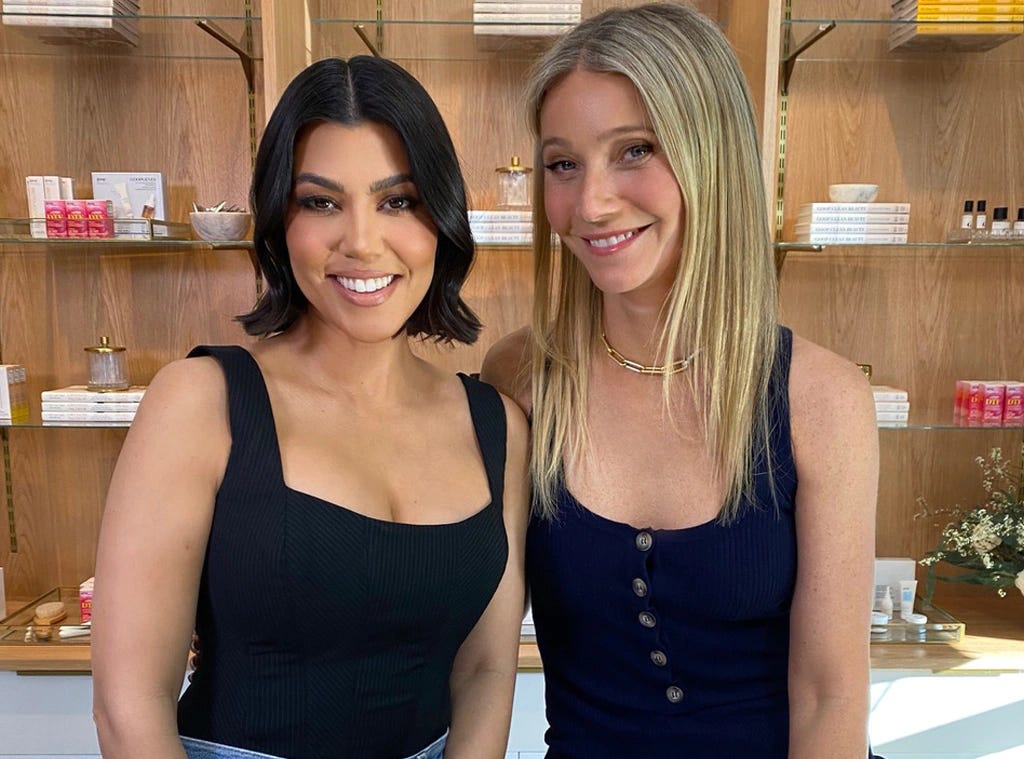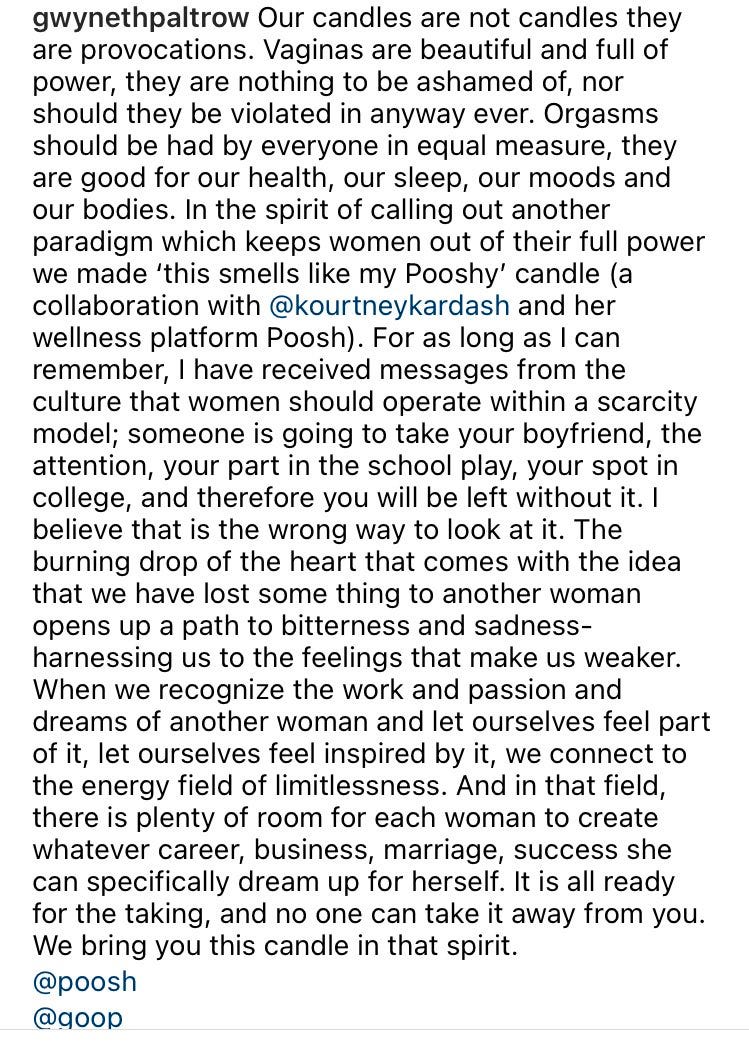Goop x Poosh isn't helping all women
In an era of "women helping women," a fear of division is holding back feminism.
Welcome to a new edition of wordcloud, a newsletter by Nicole Fallert about the space between reality and ideas. If you enjoy this content, please consider sharing and subscribing.
“Women should just help other women!”
Kourtney Kardashian and Gwyneth Paltrow are talking about candles.
In the most recent episode of The Kardashians on Hulu, Paltrow, founder of wellness empire Goop, and Kardashian, founder of wellness empire Poosh, are having a coded conversation about women having power in the “wellness space.” Paltrow and Kardashian relate there’s not much room for other female founders like them to be successful in their industry — a global business estimated to be worth more than $1.5 trillion with annual growth of 5 to 10 percent.
Paltrow doesn’t bring up any specific challenges she’s faced, nor does Kardashian, about an industry that’s been hailed by mainstream media as “female-dominated.” We’re just supposed to sit with the fact it’s just been really hard for these white women who are worth $200 million (Paltrow) and $65 million (Kardashian), respectively to start their businesses.
The scene feels highly staged to the viewer. Kardashian and Paltrow sit like strangers with ample space between them - everything around them - including their bodies and the language they use is markedly clean. They discuss their shared experiences moving on to new long-term relationships post-kids and how it’s best to take it gradually before moving the family to live with the new partner (let’s not forget that at this point in the show, viewers have been repeatedly told Kardashian owns her own home, her kids’ father owns a home and her fiancé owns a home).
Paltrow cuts the small talk and brings up the concept of a Goop X Poosh collaboration. When you Google these celebrity-owned brands they are self-described as “a modern lifestyle brand” (Goop) and “the modern guide to living your best life” (Poosh). At this point, my mind is spinning about what unique concept could result by the coming together of these highly distinct brands.
You really have to watch it, but Paltrow basically chokes on her words while carefully talking in her famous monotone about women helping other women in the wellness world — this appears to be the only reason for the Paltrow-Kardashian collaboration. The two hardly cite their friendship/shared inspiration, etc. Paltrow is barely audible as she proposes a clean-cut idea for a candle that shares both of their brands’ ethos.
The scene switches to Kardashian’s 1:1 to the camera, and she tells viewers that she received backlash when she first started Poosh — people felt that she was coming for Goop. So rather than prove that point, she’s throwing a curve ball and working with the other top player. Okay, so now viewers know this is just a business decision for Kardashian. For Paltrow, it’s a downright good look after so many years of dominance to make room for another celebrity female rising the ranks of the yoni egg market.
That’s when the “women helping women” line drops.
I don’t remember how many times in my upbringing I’ve been told this paradigm; whether it was a social, professional or academic setting, the mandate to uplift/empower other females was the mission by which I was raised. To go against this mantra was to be anti-feminist. It would hurt the overall goal of equal rights for women to challenge other women, whether in the meeting room or the group text. Any idea for all women was the right idea — but who does that so-called good idea speak for?
Shannon Keating states it better than I do in her piece on mainstream feminism’s “flop era” for BuzzFeed News:
“The feminism of the aughts — which is to say, white feminism, neoliberal feminism, choice feminism, take your pick — was all about leaning in and girlbossing our way out of oppression, even though that only really works the closer you are to a cis white guy and relies on the exploitation of poorer women’s labor.”
Let’s get one thing clear: when white/cis/het/female folks tell one another to avoid division it’s not because they want everyone to have a nice time at sorority chapter.
To make room for other women’s voices would set a dangerous precedent that it’s OK for people who do not fit dominant categories to have a voice. In this world, Paltrow and Kardashian are not the only two on stage. In fact, they may have to step off the platform altogether.
Paltrow and Kardashian feel safe working together as long as they’re competing against other white men in the wellness industry. But their words are empty to other women who do not fit their category - non-cis, non-het, low income, people of color who are the ones most likely raised with the traditional “wellness” practices big brands like Goop whitewash.
Keating writes for BuzzFeed News that Betty Freidan’s The Feminine Mystique was hailed as a holy text of this middle-class Paltrow-esque white feminism. The 1963 book spoke to women like Paltrow and Kardashian because it freed them from the obligation of domestic labor and gave them permission to compete with white men for capital —- without the mention of how childcare, housework and other unpaid labor are offset to low-income, non-white women. And how those women get left behind by this so-called feminist movement of white women making money. Is a candle supposed to solve this?
Keating writes that feminist bell hooks said of Freidan: “She made her plight and the plight of white women like herself synonymous with a condition affecting all American women. In so doing, she deflected attention away from her classism, her racism, her sexist attitudes towards the masses of American women.”
Bringing up classism, racism and sexism in so-called feminist settings is labeled as counterintuitive to the mission of women helping one another, Koa Beck writes in her book White Feminism. “Women helping women” is a kind of silencing that assures the middle-class white feminist is still more powerful than any other group — the solution is a good one for all women as long as white women are still the first in line. Expect that if you bring up anything that doesn’t make a white woman feel comfortable to be met with a “don’t be so divisive.”
Kardashian and Paltrow’s helpfulness is a facade. If only they were donating their millions of dollars or creating products to alleviate the hunger, housing, gun violence, sexual violence and educational insecurities facing women in our country today.
The “This smells like my pooshy” candle is now available now for $75, featuring Tahitian coconut milk (to my disappointment, the product was not given the name “Poop”). “Our candles are not candles they are provocations,” Paltrow said in a Instagram post announcing the collaboration. In the post she explains how “the culture” (assuming she means patriarchal western culture?) gave her messages that women should “operate within a scarcity model,” making women always look out for themselves rather than for other women. If the candle is truly radical, why do only a few number of people benefit from the sale of the candle? The candle is a product that will be sold for a price until it runs out of stock. I’m not sure what’s more scarce than that.
Subconsciously or not, the Paltrow-Kardashian collaboration centered entirely around themselves; the candle is a solution to their respective business problems. Individualism disguised as a collective win. A candle? Thank God, now I don’t have to worry about abortion access anymore.
Making a candle isn’t radical feminism. It’s safe housekeeping of the girlboss estate.







We all need practice stepping off our stage. Thank you for the clarity and reminder!